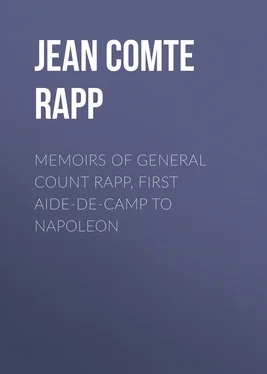Jean Comte Rapp - Memoirs of General Count Rapp, First aide-de-camp to Napoleon
Здесь есть возможность читать онлайн «Jean Comte Rapp - Memoirs of General Count Rapp, First aide-de-camp to Napoleon» — ознакомительный отрывок электронной книги совершенно бесплатно, а после прочтения отрывка купить полную версию. В некоторых случаях можно слушать аудио, скачать через торрент в формате fb2 и присутствует краткое содержание. Жанр: Биографии и Мемуары, История, foreign_edu, foreign_antique, foreign_prose, на английском языке. Описание произведения, (предисловие) а так же отзывы посетителей доступны на портале библиотеки ЛибКат.
- Название:Memoirs of General Count Rapp, First aide-de-camp to Napoleon
- Автор:
- Жанр:
- Год:неизвестен
- ISBN:нет данных
- Рейтинг книги:5 / 5. Голосов: 1
-
Избранное:Добавить в избранное
- Отзывы:
-
Ваша оценка:
- 100
- 1
- 2
- 3
- 4
- 5
Memoirs of General Count Rapp, First aide-de-camp to Napoleon: краткое содержание, описание и аннотация
Предлагаем к чтению аннотацию, описание, краткое содержание или предисловие (зависит от того, что написал сам автор книги «Memoirs of General Count Rapp, First aide-de-camp to Napoleon»). Если вы не нашли необходимую информацию о книге — напишите в комментариях, мы постараемся отыскать её.
Memoirs of General Count Rapp, First aide-de-camp to Napoleon — читать онлайн ознакомительный отрывок
Ниже представлен текст книги, разбитый по страницам. Система сохранения места последней прочитанной страницы, позволяет с удобством читать онлайн бесплатно книгу «Memoirs of General Count Rapp, First aide-de-camp to Napoleon», без необходимости каждый раз заново искать на чём Вы остановились. Поставьте закладку, и сможете в любой момент перейти на страницу, на которой закончили чтение.
Интервал:
Закладка:
"His Majesty recommends you, Prince, to transmit to him frequent accounts of your proceedings.
"When you arrive at Vienna, provide yourself with the best maps that can be procured, of the environs of that city and of Lower Austria.
"Should General Count Giulay, or any other individual, wish to have an interview with the Emperor, send him hither with all speed.
"The civic guard on duty at Vienna must amount to upwards of five hundred men.
"When once you reach Vienna you may easily obtain intelligence of the arrival of the other Russian columns, as well as of the design of those who have established themselves at Krems.
"You will have your own cavalry, together with the corps of Marshals Lannes and Davoust, in the operation of turning the Russians and falling on their rear. As to the corps of Marshals Bernadotte and Soult, they cannot be disposed of until we shall definitively know what course the Russians may adopt.
"After ten o'clock in the morning, you may enter Vienna. Endeavour to surprise the bridge of the Danube, or, if it should be destroyed, adopt the most speedy means of crossing the river: that is the grand affair at present. But if, before ten o'clock, M. de Giulay should present himself with proposals for negotiating and inducing you to suspend your march, you may stop your movement on Vienna, but you must nevertheless direct your attention to the best means of crossing the Danube at Klosterburgh, or some other favourable point.
"The Emperor directs that between Seghartz-Kirchen and Vienna you shall station, at the distance of two French leagues from each other, posts of cavalry consisting of ten men each, whose horses will serve as relays to the officers whom you may send with accounts of your movements. The men forming these posts may bear despatches from Seghartz-Kirchen to Saint-Polten. Marshal Bessières will station posts of the Emperor's guard."
CHAPTER IX
We were at Saint-Polten. Napoleon was riding on horseback on the Vienna road, when he perceived an open carriage advancing, in which were seated a priest and a lady bathed in tears. The Emperor was dressed as usual in the uniform of a colonel of the chasseurs of the guard. The lady did not know him. He enquired the cause of her affliction, and whither she was going. Sir," she replied, "I have been robbed at about two leagues from hence by a party of soldiers, who have killed my gardener. I am going to request that your Emperor will grant me a guard. He once knew my family well, and lay under obligations to them."—"Your name?" enquired Napoleon—"De Brunny," answered the lady; "I am the daughter of M. de Marbœuf, formerly governor of Corsica."—"I am delighted to meet with you, Madam," exclaimed Napoleon, with the most charming frankness, "and to have an opportunity of serving you. I am the Emperor." The lady was amazed. Napoleon consoled her, and directed her to wait for him at head-quarters. He treated her with the utmost attention, granted her a piquet of chasseurs of his guard, and sent her away happy and contented.
Napoleon had received a report, which he was reading with an air of satisfaction. I entered his closet. "Well, Rapp," said he, "do you know that we have parties of our troops in the very heart of Bohemia?"—"Yes, Sire."—"Do you know what sort of cavalry has beat the Houlans, captured posts, and taken magazines?"—"No, Sire."—"Our infantry mounted on draught horses!"—"How?"—He handed me the report. Some of our detachments who had penetrated into Bohemia, suddenly found themselves in an open tract of country: they had but twenty dragoons; they would not fall back, and they dared not advance further. In this perplexing situation, the commander thought of an expedient. He collected together all the baggage horses, mounted his infantry, and thus equipped, led them through the thick forests in the neighbourhood of Egra. Some parties of the enemy's cavalry who advanced to oppose them were driven back; we took men, horses and provisions; the latter were committed to the flames. I returned the report to the Emperor. "Well," said he, "what think you of this new kind of cavalry?"—"Admirable, Sire."—"Men who have French blood in their veins," observed he, "always know how to deal death among the enemy's ranks."
We marched close upon the enemy's rear-guard. We might easily have taken it; but we avoided doing so. We wished to lull his vigilance: we did not press him closely, and we circulated reports of peace. We suffered both troops and baggage to escape us; but the loss of a few men was of little consequence. The preservation of the bridges was the important point: if they should be broken, it was determined that we should repair them; we took our measures accordingly. The troops, who were posted in echelon on the road, were warned to allow no demonstration to escape them that was likely to put the enemy on his guard. No one was permitted to enter Vienna; but every thing being examined, and every arrangement completed, the Grand Duke took possession of the capital, and directed Lanusses and Bertrand to make without delay a reconnaissance on the river. They found at the gates of the suburb a post of Austrian cavalry. There had been no fighting for upwards of three days. It appeared as though an armistice had been entered into. Lanusses and Bertrand accosted the Austrian commandant, commenced a conversation with him, followed him closely, and would not suffer him to quit them. On reaching the banks of the river, they still persisted in following him, in spite of his wish to get rid of them. The Austrian became impatient; the French generals asked leave to communicate with the general commanding the troops stationed on the left bank of the river. They obtained permission to do so; but the 10th hussars were not allowed to accompany them, and they were consequently obliged to halt and take a position. Meanwhile our troops were advancing, led by the Grand Duke and Marshal Lannes. The bridge still remained undamaged; but the trains were laid, and the gunners held their matches in readiness: the least sign that might have indicated the intention of passing by force would have ruined the enterprize. It was necessary to resort to artifice; and we succeeded in imposing on the simplicity of the Austrians. The two marshals dismounted, and only a small detachment entered upon the bridge. General Belliard advanced, walking with his hands behind his back, accompanied by two officers of the staff: Lannes joined him with some others; they walked about, talking together, and at length joined the Austrians. The officer commanding the post, at first directed them to stand back; but he at length permitted them to advance, and they entered into conversation together. They repeated what had already been affirmed by General Bertrand, namely, that the negotiations were advancing, that the war was at an end, and that there would be no more fighting and slaughter. "Why," said the Marshal, "do you keep your guns still pointed at us? Has there not been enough of bloodshed? Do you wish to attack us, and to prolong miseries which weigh more heavily on you than on us? Come, let us have no more provocation; turn your guns." Half persuaded and half convinced, the commanding officer yielded. The artillery was turned in the direction of the Austrians, and the troops laid down their arms in bundles. During this conference the platoon of our advance-guard came up slowly, and at length it arrived, masking sappers and gunners, who threw the combustible matters into the river, sprinkled water on the powder, and cut the trains. The Austrian commander, who was not sufficiently acquainted with the French language to take much interest in the conversation, perceived that the troop was gaining ground, and endeavoured to make us understand that he could not permit it. Marshal Lannes and General Belliard tried to satisfy him; they observed that the cold was severe, and that our men were only marching about to warm themselves. But the column still continued to advance, and it was already three quarters over the bridge. The commander lost all patience, and ordered his troops to fire: they instantly took up their arms, and the artillerymen prepared their guns. Our situation was terrible: a little less presence of mind on our part, and the bridge would have been blown up, our troops in the river, and the campaign at an end. But the Austrian had to deal with men who were not easily disconcerted. Marshal Lannes seized him by the one arm and General Belliard by the other. They threatened him, and drowned his voice when he attempted to call for help. Meanwhile the Prince of Hogsberg arrived accompanied by General Bertrand. An officer set off to render an account of the state of affairs to the Grand Duke; and on his way transmitted to the troop an order to quicken their march and arrive speedily. The Marshal advanced to meet the Prince, complained of the conduct of the commander of the post, requested that he might be punished and removed from the rear-guard, where he might impede the negotiations. Hogsberg fell into the snare: he deliberated, approved, contradicted, and lost himself in a useless conversation. Our troops made the most of their time; they arrived, debouched, and the bridge was taken. Reconnaissances were immediately ordered in every direction; and General Belliard led our columns on the road leading to Stockrau, where they took a position. Hogsberg, mortified at his ill-timed loquacity, proceeded to the Grand Duke, who, after a short conversation, referred him to Napoleon, and also crossed the river.
Читать дальшеИнтервал:
Закладка:
Похожие книги на «Memoirs of General Count Rapp, First aide-de-camp to Napoleon»
Представляем Вашему вниманию похожие книги на «Memoirs of General Count Rapp, First aide-de-camp to Napoleon» списком для выбора. Мы отобрали схожую по названию и смыслу литературу в надежде предоставить читателям больше вариантов отыскать новые, интересные, ещё непрочитанные произведения.
Обсуждение, отзывы о книге «Memoirs of General Count Rapp, First aide-de-camp to Napoleon» и просто собственные мнения читателей. Оставьте ваши комментарии, напишите, что Вы думаете о произведении, его смысле или главных героях. Укажите что конкретно понравилось, а что нет, и почему Вы так считаете.












